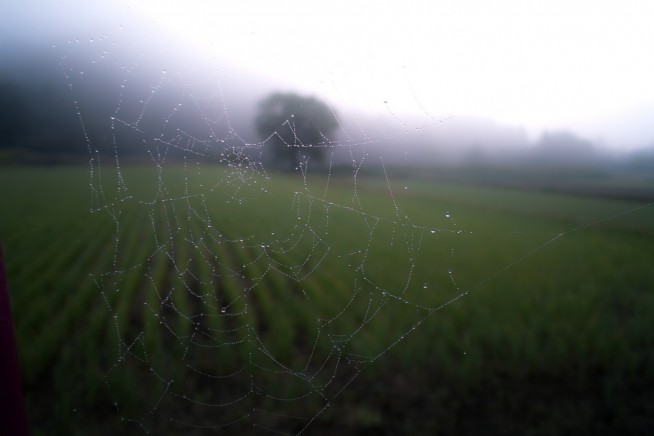Lately I’ve been spending a lot of time outdoors. Like me, perhaps you love being outside. But have you ever stopped to wonder why?
Why is it so soothing to watch sunlight filtering through tree leaves?
Why is there nothing better than a clear, starry night?
Why do scenes like the Grand Canyon take your breath away?
When I’m stuck inside, at a computer, on a beautiful sunny day, I feel physically ill. I feel desperate to get outside. My body tightens at the thought of spending one more minute at my keyboard. When I lived in Boston, the park across the street literally saved my life. I could escape for a walk at lunch or after dinner and feel the stresses of my day melt away.
Now that I’m living in the woods, I’ve realized how much noise pollution I was putting up with in my city life. Here, I go out on a tin boat with my husband, and as soon as he cuts the engine there is an immense sense of peacefulness. The only sounds are water, birds, and wind. Spending just twenty minutes in this level of peace is enormously healing.
There are probably many reasons why most of us love being outside. From an evolutionary standpoint, ancient humans spent most of their time outdoors – listening to water, birds, and wind – not traffic, TV, and cell phone conversations.
But I also think there’s a deeper, dare I say spiritual, reason that we love the outdoors. Intellectuals and philosophers like Ralph Waldo Emerson and Henry David Thoreau believed that a deep study of the natural world represented a path toward transcending this world and reaching enlightenment.
Transcendentalists like Emerson believed that the natural world is an outward reflection of our inner spirit.
In his most famous essay, Nature, Emerson wrote that nature expresses the “radical correspondence of visible things and human thoughts” and that “The world is emblematic. Parts of speech are metaphors, because the whole of nature is a metaphor of the human mind.”
Thoreau, who spent two years, two months, and two days living in a cabin in the woods, put it this way:
“I went to the woods because I wished to live deliberately, to front only the essential facts of life, and see if I could not learn what it had to teach, and not, when I came to die, discover that I had not lived.”
During my past few weeks of living in the woods, these authors’ sentiments have finally started to dawn on me. I’ve observed beautiful aspects of nature, like sunsets and loons and deer. But I’ve also seen the darker side of mother earth, like death, decay, and the fight to survive. What I’ve come to realize is that nature is perfect. But not in a romantic, idealized way full of rainbows and flowers.
The natural world is a perfect representation of our inner world. @BethanyButzer
(Click to Tweet!)
There is beauty and depth and love beyond our wildest imaginings. But there is also suffering and death. These are cycles that repeat themselves in all of us. And all cycles have their place. In the same way that a spontaneous forest fire might be necessary to cut back on overgrowth, or one animal needs to eat another – we all experience inner cycles of suffering.
An interesting difference between us and the natural world, however, is that mother nature doesn’t complain about it. She doesn’t resist it. She doesn’t worry about it. She holds it all. Accepts it all in the present moment exactly as it is. She knows that this animal had to die to feed another. She knows that the thunderstorm had to happen so that the trees could grow. And she knows that the sun will rise tomorrow – even if it’s cloudy and we can’t quite see it.
On the spiritual path, many people seek a guru or teacher. However this process has always felt false to me. Like Emerson and Thoreau, I’ve had a longstanding belief that while teachers can be helpful at times, the path to Ultimate Truth exists within each of us individually.
My time here in my cabin has made me realize that my teacher, my guru, and my spiritual guide is nature itself.
By simply observing mother nature’s cycles in relation to my own, I believe that I can tap into my Truth, my Soul, and my ultimate potential. I can do my best to embody the essence of a tree – firmly grounded into the earth but flexible enough to withstand the most brutal storms. I can embody the patience, presence, and delicate nature of a deer. I can hold the heartache of a mother bird that just lost its baby to a predator.

In a sense, this blog is an open letter to mother nature herself, saying that I am ready. I am ready to take her on as my teacher and guide. I am ready for the lessons that she needs to teach – even if they are difficult. I am ready to surrender the way that I think things should be, and accept things as they are. I am ready to be soft like the wind, passionate like fire, grounded in the earth, and as supple as water.
As Emerson said, “The happiest man is he who learns from nature the lesson of worship.”
What has mother nature taught you? I’d love to hear from you in the comments below!
Bethany Butzer, Ph.D. is an author, speaker, researcher, and yoga teacher who helps people create a life they love. Check out her book, The Antidepressant Antidote, follow her on Facebook and Twitter, and join her whole-self health revolution.
If you’d like tips on how to create a life you love, plus some personal instruction from Bethany, check out her online course, Creating A Life You Love: Find Your Passion, Live Your Purpose and Create Financial Freedom.
Image courtesy of Genta Mochizawa.












